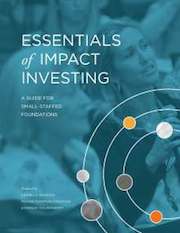Publication Date: April, 2014
... for Family Philanthropy and Youth Philanthropy Connect, a program of the Frieda C. Fox Foundation, have joined together to bring new resources to ...
Publication Date: April, 2025
This weekly funder briefing webinar series welcomed New Jersey-based grantmakers along with national funders and provided an opportunity for grantmakers to hear from a wide range of nonprofit experts. This series started on March 13, 2025, less than a month after the first executive order was issued and continued through April 24, 2025. The written summaries of each recording are listed below.
Publication Date: February, 2013
This paper explores community democracy as a cultural choice and a potential organizing system for philanthropy using stories that demonstrate its principles and practices, primarily growing from the experience of northern California communities. This experience offers a framework of principles and a beginning set of conclusions about how philanthropy can develop productive partnerships from the perspective of a place-based, community democracy.
... on December 13 explored how two foundations, The Claneil Foundation and Weingart Foundation , are using general operating support, multi-year ...
Publication Date: December, 2018
... Michelle Greanias from PEAK Grantmaking focused on how foundation CEO’s, program officers, staff, and trustees could engage internally ...
Publication Date: August, 2016
Foundation leaders have a unique opportunity to serve as ... conversation in the boardroom; a conversation about your foundation’s goals, approach, and, most importantly, vision ... The Power of Board Advocacy: A Discussion Guide for Foundation Boards ...
Publication Date: November, 2018
Assessing the performance of a foundation is notoriously challenging, but it is crucial to learning and improvement. How well do foundation leaders believe they understand what is and isn’t working in their foundation’s programmatic efforts? How are they building ...
Publication Date: August, 2008
What would good foundation practice with solid evaluative inquiry at its core look like? Find out how your foundation can rethink the role of evaluation and turn it ... tool. The Evaluation Conversation - A Path to Impact for Foundation Boards and Executives ...
Publication Date: April, 2010
... A Growing Tradition? Examining the African American Family Foundation ...
The Westfield Foundation proudly announces the recipients of its first ... support for organizations funded for decades. The foundation's Trustees have greenlit four impactful projects ... our youngest to oldest community members. The Westfield Foundation Announces 2024 Q1 Grantees ...
The Summit Foundation awarded $333,754 in grants to 23 local non-profit ... Summit area,” said Dana Turk, President of The Summit Foundation. Summit Foundation Awards Over $300,000 in Grants ...
Publication Date: January, 2010
These guides are designed to help foundations consider how more diverse and inclusive practices might advance their mission by making their work more effective and more reflective of communities served. By highlighting 10 ways foundations can approach diversity, this guide seeks to spark ideas and launch further dialogue.
There are three versions of this resource one for family, community and independent foundations.
The Westfield Foundation is proud to announce that at their recent Board ... amount requested. These grants showcase the Westfield Foundation's steadfast dedication to nurturing a dynamic, ... Through funding a wide range of initiatives, the Foundation seeks to meet pressing needs and enhance the ...
Publication Date: September, 2015
Seeking to increase their philanthropic impact, many engaged foundations are turning to impact investing. The reason is clear: The field and practice of impact investing have matured—structures are in place, best practices have emerged, and opportunities have multiplied—enabling more foundations to use this powerful tool. Yet entering unfamiliar terrain can be intimidating, and foundations with few or no staff face unique challenges even as they enjoy unique opportunities.
Essentials of Impact Investing: A Guide for Small-Staffed Foundations addresses those challenges and highlights those opportunities. The guide demystifies the process of designing and implementing an effective impact investing strategy, offering advice, tools, and real-world examples of impact investing by foundations with few or no staff.
The Iselin-based Provident Bank Foundation recently announced its Major Grant recipients for its second cycle of 2023. The foundation awarded $410,000 in total to 35 nonprofit organizations within the foundation’s three priority funding areas: Community ...
... services. The awards were approved as part of The Summit Foundation’s June grant cycle. The Summit Foundation fosters philanthropy by identifying local needs ... to tax-exempt organizations that serve our area. Summit Foundation Awards Grants Totaling $326,000 ...
The Westfield Foundation is proud to announce the allocation of $52,000 in ... funding to $278,000. This quarter’s grants reflect the Foundation’s ongoing dedication to improving community ... Katie Curran Darcy, Executive Director of the Westfield Foundation. "These investments in critical areas, provide ...
The Montclair Foundation has awarded $65,000 in Fall 2023 Grants to ... serve the Montclair community and beyond. The Montclair Foundation nurtures growth in our community through support ... and underserved communities in Montclair. The Montclair Foundation Awards $65,000 in Grants ...
The Provident Bank Foundation on Monday announced the Major Grant recipients for its first cycle of 2023. The foundation awarded $291,000 of total funding to 26 nonprofit organizations within the foundation’s three priority areas of Community Enrichment, ...
... measures as a response to rising antisemitism, the Tepper Foundation noticed that fears were particularly heightened ... among young families. In response, the grantmaking foundation announced on Monday that it will deploy $2.5 ... consultant who serves as a portfolio manager at The Tepper Foundation, told eJewishPhilanthropy. Tepper Foundation ...

